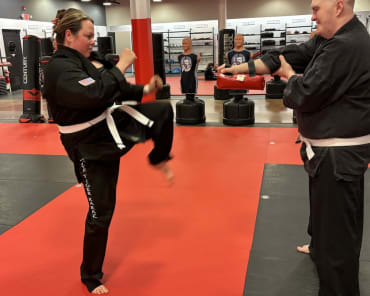
As parents, we’ve all noticed differences in how our children interact with the world. Some kids love socializing, leading group activities, and constantly being on the go, while others prefer quiet play, independent tasks, and need time to warm up in social settings. These differences stem from whether your child leans more toward introversion or extroversion—two natural personality traits that shape how they gain and expend energy. Understanding these differences can help us better support our children in school, social settings, and extracurricular activities like martial arts or sports. Let’s explore the key differences between introverts and extroverts, how their brains function, and practical ways to set them up for success. The Science Behind Introverts & Extroverts 1. Energy & Stimulation Introverts have a lower threshold for stimulation, meaning they get overwhelmed more easily and prefer calm, structured environments. They often need alone time to recharge after social activities. Extroverts thrive on higher levels of external stimulation and are energized by social interactions, group activities, and new experiences. 2. Brain Chemistry & Response to Reward Dopamine Sensitivity: Introverts process dopamine (the brain's "reward chemical") more efficiently, meaning they feel content with less external stimulation. Extroverts, however, require more excitement, novelty, and engagement to feel the same level of reward. Processing Information: Introverts engage the frontal cortex more, which is responsible for deep thinking and decision-making. They tend to analyze before acting and prefer structured learning. Extroverts have higher activity in the brain’s reward center, making them more reactive to immediate social engagement and feedback. Understanding & Supporting Introverted Children Introverted children are often thoughtful, observant, and deep thinkers. However, without the right support, they may struggle with anxiety, overwhelm, and social exhaustion. Common Introvert Traits: ✔ Prefers small groups or one-on-one interactions ✔ Needs time to process information before responding ✔ May become overstimulated in noisy or chaotic environments ✔ Enjoys independent activities like reading, drawing, or puzzles ✔ Recharges through alone time Potential Setbacks Without Proper Support: ❌ Anxiety in high-energy social settings ❌ Meltdowns when overstimulated ❌ Panic attacks or withdrawal in new situations How Parents Can Help: ⭐ Encourage Personal Goals – Instead of focusing on competition, help your child set individual challenges, like how many kicks they can do without stopping in martial arts or how many pages they can read in a day. ⭐ Balance Group & Solo Activities – While social interactions are important, allow for quiet downtime to recharge. ⭐ Create a Safe & Supportive Environment – Give them space to think before answering questions, and don’t always force participation in group discussions. Understanding & Supporting Extroverted Children Extroverted children are naturally outgoing, energetic, and thrive in social settings. However, if not guided properly, they may struggle with impulsivity, frustration, or a need for constant engagement. Common Extrovert Traits: ✔ Loves being around people and making new friends ✔ Feels energized by group activities and team settings ✔ Enjoys fast-paced, hands-on learning ✔ Expresses emotions openly and seeks validation ✔ Thrives with immediate feedback and encouragement Potential Setbacks Without Proper Support: ❌ Difficulty focusing in quiet, independent activities ❌ Frustration or tantrums when not engaged ❌ Impulsivity and difficulty waiting for turns How Parents Can Help: ⭐ Give Leadership Opportunities – Let them take the lead during activities like setting up a family game night, leading warm-ups in martial arts, or helping younger siblings. ⭐ Encourage Verbal Expression – Let them talk through their ideas and share their excitement; journaling or storytelling can be a great outlet. ⭐ Keep Activities Engaging & Dynamic – Structured movement, interactive learning, and physical activities help extroverts stay engaged. Helping Your Child Thrive in Martial Arts & Beyond Whether your child is introverted, extroverted, or somewhere in between, martial arts provides an excellent environment for personal growth. The right program offers structured learning for introverts and high-energy engagement for extroverts, helping each child build confidence, discipline, and resilience. By understanding how your child processes the world, you can guide them toward environments that respect their personality while encouraging personal growth.





